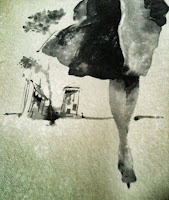 This morning I finished reading "I'll Never Be Young Again" by Daphne du Maurier. I'm not sure why, but I decided to scroll down on the book's Goodreads page and see what people had said about it. Normally I avoid this, but I had a mild curiosity. This is Du Maurier's second book, and I think a lot of people used that as an excuse for why they didn't enjoy it. This argument makes no sense to me as a devout Du Maurier lover. Her first book, "The Loving Spirit," was brilliant. It stands to reason that she would explore different styles, and anyone familiar with her at all should know that this wasn't just an early phase of experimentation. Du Maurier dabbled in a great many styles of writing throughout her career -- it's just that she is more well known for "suspense." Several reviewers of this book found it boring and disappointing, some unable to finish it. I, however, fell in love with this book from the first page.
This morning I finished reading "I'll Never Be Young Again" by Daphne du Maurier. I'm not sure why, but I decided to scroll down on the book's Goodreads page and see what people had said about it. Normally I avoid this, but I had a mild curiosity. This is Du Maurier's second book, and I think a lot of people used that as an excuse for why they didn't enjoy it. This argument makes no sense to me as a devout Du Maurier lover. Her first book, "The Loving Spirit," was brilliant. It stands to reason that she would explore different styles, and anyone familiar with her at all should know that this wasn't just an early phase of experimentation. Du Maurier dabbled in a great many styles of writing throughout her career -- it's just that she is more well known for "suspense." Several reviewers of this book found it boring and disappointing, some unable to finish it. I, however, fell in love with this book from the first page.Anyone doubting Du Maurier's ability to hook you with suspense early in her career should read the first chapter of this book more closely. Dick's description of impending death as he stands on the edge of a bridge ready to jump was more than enough to convince me I was at home in this novel.
"It seemed strange that things could still be done to me after I was dead, that my body would perhaps be found and handled by people I should never know, that really a little life would go on about me which I should never feel....Not the fear of that hasty look round, the sudden plunge headlong and the giddy shock of hard, cold water, the river itself entering my lungs, rising in my throat, tossing me upon my back with my arms out-flung--I could hear the sob strangled in my chest and the blood leave me--but fear of the certain knowledge that there was no returning, no possible means of escape, and no other thing beyond....I felt the flesh that was mine and the body that belonged to me; queer to think it was in my power to destroy them so swiftly."
Later, of course, there are instances of her humor and surprising worldliness as Dick begins his life journey anew. Du Maurier reveals that she knows the human mind and mood and the self-denial of predictability. Dick had been shut off from the world -- sheltered in his parents' home for years until he ran away, thinking there must be nothing in the world for him. It was a beautiful experience to watch Dick awaken to life like a child, and sad to watch his eventual complacent acceptance of responsibility. However, we all know that for him to survive, this must occur. He must get steady work and support himself in society -- with only his memories of adventure to remind him that there once was more to life. But without these experiences, his mind would be dull and lacking in compassion. Truly a man formed by his relationships, he will remember those that he lost in his surreal other-life, taking with him the wisdom they both knowingly and unknowingly imparted.
"She's no longer young, you see, Richard, this is her home. Her roots are here, the whole meaning of her life. Even now that he is dead she will go on, with her memories, and it will be her consolation, living with them."
Because we all must live and die, and find our place in the world. And we can only hope that in our death, those we have touched will carry our memories with them.
No comments:
Post a Comment